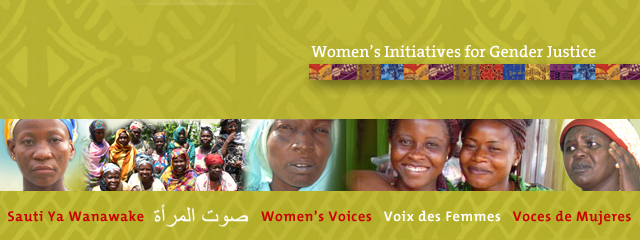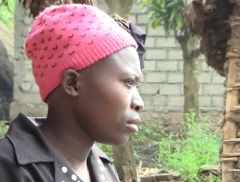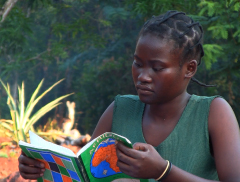|
|
||
|
||
 |
||
August 2012 |
||||
Welcome to the |
||||
|
||||

The Women's Initiatives for Gender Justice is an international women's human rights organisation that advocates for gender justice through the International Criminal Court (ICC) and through domestic mechanisms, including peace negotiations and justice processes. We work with women most affected by the conflict situations under investigation by the ICC. The Women's Initiatives for Gender Justice works in Uganda, the Democratic Republic of the Congo, Sudan, the Central African Republic, Kenya, Libya and Kyrgyzstan. Offices 
|
Dear Friends,Welcome to the August 2012 issue of Women's Voices, our regular eLetter from the Women's Initiatives for Gender Justice. In Women's Voices, we provide updates and analysis on political developments, the pursuit of justice and accountability, the participation of women in peace talks and reconciliation efforts from the perspective of women's rights activists within armed conflict situations, specifically those countries with Situations under investigation by the International Criminal Court (ICC) including Uganda, the Democratic Republic of the Congo (DRC), Darfur, the Central African Republic (CAR), Kenya, Libya and Côte d'Ivoire. In addition to Women's Voices, we also produce a regular legal eLetter, Legal Eye on the ICC, with summaries and gender analysis of judicial decisions and other legal developments at the International Criminal Court (ICC), and discussion of legal issues arising from victims' participation before the Court, particularly as these issues relate to the prosecution of gender-based crimes in each of the Situations under investigation by the ICC. More information about the work of the Women's Initiatives for Gender Justice and previous issues of Women's Voices and Legal Eye on the ICC can be found on our website www.iccwomen.org. ICC recruitment for position of RegistrarThe International Criminal Court is seeking applications for the position of Registrar of the ICC. Applications close 27 August 2012. ■ Read more about the application process and the job description. Please forward this information to your networks and encourage qualified and experienced candidates to apply for this important post. The current term of the Registrar will end in April 2013. The Registrar, as head of the Registry, is responsible for the non-judicial aspects of the administration and servicing of the Court. Pursuant to Article 43(4) of the Rome Statute, the Registrar, who shall serve on a full-time basis, is elected by the plenary of the judges of the Court, taking into account any recommendation of the Assembly of States Parties (ASP). She or he shall serve a five-year term, renewable once for the same period subject to re-election. Preferably, the post will be filled by a national of an ICC State Party, or of a State that has signed and is engaged in the ratification process or accession process; however, nationals from non-State Parties can also be considered. Applications from female candidates are particularly encouraged. Sudan :: Women's human rights defender arrested in KhartoumOn 3 July 2012, Nahid Gabralla, Director of the SEEMA Centre for Training and Protection of Women and Child's Rights[1] and prominent Sudanese women's human rights defender, was arrested in her office in Khartoum by four National Security officers. It is reported that one of the Officers entered Ms Gabralla's office and immediately confiscated her mobile phone. When Ms Gabralla's staff enquired about what was happening, the officers said they were taking Ms Gabralla for questioning, but denied that they were arresting her. Ms Gabralla's whereabouts remained unknown until later in the evening when her family was able to locate her in a security centre in North Khartoum. It is believed that Ms Gabralla has since been transferred to the Altayebat women prison in Omedurman where she continues to be detained. Ms Gabralla's arrest occurs in the context of escalating state action against human rights defenders in Sudan. As of 29 June 2012, following the recent public protests, it was reported that approximately 1,000 human rights defenders and activists had been arrested or detained by Sudan's security forces.[2] Multiple sources indicate that detainees, including women, have been subjected to beatings and torture. Since her arrest, Ms Gabralla, who is currently undergoing treatment for a medical condition, has been permitted limited communication with her family but she has not been allowed any contact with her SEEMA Centre colleagues. Ms Gabralla's family has been informed that the security officers are following the instructions of high-level state officials, that an investigation has been concluded, and that Ms Gabralla will accordingly not be released. No further information has been provided about the reason for Ms Gabralla's arrest. In clear violation of international human rights standards, the 2010 National Security Act allows the National Security Service to keep the accused in custody for up to four and a half months without having access to a lawyer and without a trial. On 24 June, another staff member of the SEEMA Centre, Mr Faisal Shabo, Finance and Administration Officer, was arrested by the National Security. Mr Shabo was taken to an unknown location, where he is supposedly still detained. No explanation was provided about Mr Shabo's arrest. On 13 July, another women's human rights defender, Zainab Badr Eldin, Director of the organisation ALAM-Teachers First for Training and Research, and her daughter Wala Salah Mohamed Abdelrahman, Advocacy and Networking Officer for the Strategic Initiative for Women in the Horn of Africa (SIHA) were arrested during a demonstration. Ms Badr Eldin and her daughter were both released the same day they were arrested. Their arrests follow that of Ms Badr Eldin's son, Mohammad Salah Mohammed Abdelrahman, who was severely tortured while in detention due to his active participation into the student demonstrations against the Government in Khartoum. The Women's Initiatives for Gender Justice is closely following the events taking place in Sudan, and calls for the immediate release of Ms Gabralla and Mr Faisal Shabo and of all other human rights advocates and women's human rights defenders who were recently arrested in the country and are still in detention. Video Advocacy Project :: Gender justice videos available on our websiteIn June, the Women's Initiatives for Gender Justice launched a new video feature on our website. The first two videos posted on the site are Our Plea, which exposes the attacks of the Lord's Resistance Army (LRA) on communities in the Central African Republic (CAR); and Our Voices Matter, which highlights the multiplicity of perpetrators operating in Eastern Democratic of the Congo (DRC), the lack of accountability for these crimes, and the medical services, psychosocial assistance and economic support urgently needed by victims/supporters. Read more on Our Plea and Our Voices Matter below. Our Plea and Our Voices Matter are part of a larger video advocacy initiative launched in 2010 between the Women's Initiatives for Gender Justice and WITNESS. The project will produce six gender justice films highlighting sexual and gender-based violence and other gender issues in armed conflicts, fragile states and post-conflict environments. Five of the six documentary countries selected for the project currently have situations under investigation by the ICC. They are also countries where the Women's Initiatives has extensive domestic peace and justice programmes and well established partnerships with a large number of grassroots women's rights and peace advocates, networks and organisations. Since the beginning of this joint initiative in 2010, more than 30 of Women's Initiatives' partners from the CAR, the DRC, Uganda, Kenya and Kyrgyzstan, all of them women's human rights and peace advocates, have participated in a series of video advocacy training and subsequently were able to film, conduct interviews and co-edit the videos. All of the films will be available on our website in the coming months. DRC :: Our Voices MatterOur Voices Matter features testimonies of six women victims/survivors of rape and other forms of sexual violence from North Kivu, South Kivu and Province Orientale. Through their interviews, all conducted by local women's rights advocates and partners of the Women's Initiatives, this advocacy film highlights the multiplicity of perpetrators operating in Eastern Democratic Republic of the Congo (DRC), the lack of accountability for these crimes, and the medical services, psychosocial assistance and economic support urgently needed by victims/survivors. Our Voices Matter is a call to action to the Congolese Government to provide victims/survivors with the necessary medical and economic assistance, ensure domestic accountability for perpetrators, and increase their cooperation with the ICC. The film also calls upon the international community, especially the United Nations, the African Union and the International Conference on the Great Lakes Region, to support initiatives to prevent these crimes in the DRC, ensure the protection of women and girls and support ICC prosecutions.
The scale of the ongoing violence in Eastern DRC, including the widespread commission of sexual and gender-based crimes, along with limited availability of medical and other support services and economic opportunities, as well as the stigma associated with sexual violence crimes, contributes to a culture of lawlessness, impunity, poverty and trauma. Our Voices Matter demonstrates the ways in which these factors impact disproportionately on women and girls. Existing laws within the DRC including the Sexual Violence Act (2006) and the National Strategy to Combat Violence Against Women (2009) are intended to strengthen prosecutions for sexual violence and provide medical and other support to victims/survivors of rape and other forms of sexual violence. However to date little progress has been made in implementing the National Strategy and perpetrators are rarely prosecuted. In Our Voices Matter, Elisabeth, recalls the reaction of the police after she reported to them that she had been raped by two soldiers of the DRC Army. 'The next morning, I went to the Congolese police in order to complain. There at the police one told me: "You are too old, you can't be raped". I didn't get justice, nobody gets justice. They only told me "Go home! We'll see what to do about it." And then nothing ever happened.' Elisabeth added that 'many women who are raped go to seek justice. When you go to the police, you'll find that they contribute to rapes. They are discouraging us by not taking our complaints into consideration.' Even when perpetrators are prosecuted, sentences are often not enforced; and for those imprisoned, escape is a viable option. One of the victims/survivors interviewed in Our Voices Matter was among the 63 women who were raped by FARDC Colonel Kibibi and his men during the Fizi New Year's mass rape on 1 January 2011. Kibibi and his men were former members of the Congrès national pour la défense du peuple (CNDP), a rebel group integrated into the DRC Army following the signing of the 23 March 2009 Goma Agreement between the Congolese government and the CNDP. Together with 48 other victims/survivors she testified during a trial held in Baraka, South Kivu. Kibibi and 10 of the soldiers under his command were tried by a special mobile gender court in Baraka and found guilty of rape as a crime against humanity. While this was not the first trial in which members of the Congolese army have been convicted for rape and other forms of sexual violence,[6] Lieutenant-Colonel Kibibi was the first FARDC commanding officer and the first military figure within the DRC to have been charged with crimes against humanity for sexual violence acts. Following the sentence, the Congolese Government declared that it would compensate each victim with USD 10,000. However, no action has been taken to compensate victims/survivors of this case. 'We won the trial in Baraka but until now we haven't even received copies of the judgement. The government told us that it would compensate us, but since then we haven't seen anyone come to us, neither the authorities nor the judges', said an interviewee in Our Voices Matter. The testimonies in Our Voices Matter echo the hundreds of experiences recorded since 2006 by the Women's Initiatives through our joint documentation and victim/survivor support programmes carried out in collaboration with partners in Eastern DRC. The 25-minute gender justice video was first screened at the 12th AWID Forum in April 2012 during a panel hosted by the Women's Initiatives. This was followed by the national launch of the video in Kinshasa on 12 June 2012 at an event attended by representatives of the Congolese Government, the UN, the diplomatic missions and the media. In her speech during the launch, Stella Yanda, Executive Secretary of Initiatives ALPHA, a Women's Initiatives' partner in South Kivu and one of the producers of the film, highlighted the importance for victims/survivors of receiving justice. 'We have produced this video to show that justice is part of the treatment for victims/survivors of sexual and gender-based crimes' Ms Yanda said. 'We all need to support the efforts towards ending sexual and gender-based crimes and providing victims/survivors with the necessary support. We also need to work to discourage the practices which contribute to the trivialisation of sexual crimes at the family and community level as well as within the judiciary,' she added. Before being publicly launched, the film was also privately screened for the newly appointed Congolese Minister of Justice and Human Rights, Ms Wivine Mumba Matipa. During this private meeting, Ms Matipa expressed her appreciation for this initiative and ensured her commitment to increasing the access to justice for victims/survivors of rape and other forms of sexual violence. In the coming months, more strategic screenings of the gender justice advocacy video will be organised with key audiences by the Women's Initiatives and its country-based partners, including in Eastern DRC. ■ Read the press release of the launch of Our Voices Matter in English and in French. ■ Read more about our programmes in the DRC in our eLetter Women's Voices and in In Pursuit of Peace I À la poursuite de la paix. CAR :: Our PleaOur Plea features the testimonies of two young women, Léa and Joëlle, who were abducted by the Lord's Resistance Army (LRA) in the South-Eastern provinces of the Central African Republic (CAR). It is estimated that hundreds of women and girls have been abducted and forcibly recruited by the LRA in attacks against the civilian population in the CAR. Léa's and Joëlle's testimonies reflect the experience of many victims of the crimes committed by the LRA for more than two decades, including abduction of children, pillaging and destruction of villages, torture, rape and enslavement including sexual enslavement of children and adults forced to fight for the LRA. Interviewed by local partner JUPEDEC, in Our Plea Léa and Joëlle describe their experiences within the LRA, their lives following their return to their communities and their efforts to start over. Léa was a student when she was abducted by the LRA one evening on her way home from working in the fields in Zemio district. She recounts how she was beaten and obliged to carry heavy loads, and how she was handed to an LRA officer to become his 'wife'. 'Now, my head is not calm, my way of thinking is different', she says. 'When I think of my future it looks grim because of the men who destroyed my life.' Joëlle was abducted on a Sunday afternoon in Rafai. She was raped and became pregnant while in captivity. She now lives with her grandmother and her child. 'I was subjected to sexual violence, mistreatments and torture. I was made to carry loads', she says. Once abductees return to their communities, there are no structures in place to ensure their needs are addressed. The support received by LRA returnees usually comes from their communities and from organisations such as JUPEDEC. However, resources are very limited and the needs of victims/survivors remain largely unmet. 'Since I left captivity, I haven't received anything besides moral support from my community', Joëlle says. Both Léa and Joëlle request support from the Government as well as their commitment to bring LRA members responsible for crimes in the CAR to justice.
'Women have died in the bush, and others keep on suffering,' says Léa. 'I am asking ICC to have Joseph Kony and his officers arrested. They should be brought to justice to answer for what they have done, for the sufferings and losses and the blood which has spilled in the Central African Republic.' Alexis Lewis Mbolinani, founder of JUPEDEC and Director of the video, confirms that the LRA began its activities in South-Eastern CAR in February 2008 with an attack in Bambouti. In March 2008, the LRA attacked Obo killing 90 people, almost all of them children and girls. 'In our research, we have demonstrated that girls and women are targeted for sexual exploitation,' Mr Mbolinani said. Our Plea was launched by the Women's Initiatives for Gender Justice and WITNESS in The Hague on 30 May 2012 with a private screening for the Office of the Prosecutor of the International Criminal Court (ICC). The video was also shown to representatives of States Parties to the ICC on 1 June 2012. In the coming months, more strategic screenings of this gender justice advocacy video will be organised with key audiences, including high officials of the CAR government, the UN and the ICC. The national launch of Our Plea will be held in CAR in the coming months. This nine-minute gender justice video is a strong call to action to the ICC to open investigations into LRA crimes committed in the CAR, and to the CAR Government to provide urgent medical, psychosocial and economic assistance for the rehabilitation and reintegration of LRA victims/survivors, especially girls and women including those returning with children born as a result of rape and sexual enslavement. ■ Read the press release of the launch of Our Plea. ■ Read more about our programmes in the CAR in our eLetter Women's Voices and in In Pursuit of Peace I À la poursuite de la paix. |
|
Footnotes1 The SEEMA Centre for Training and Protection of Women and Child's Rights is a Khartoum-based centre that provides services and assistance to victims/survivors of sexual and gender-based crimes. It is also dedicated to the promotion of Sudanese women's human rights through capacity building and advocacy, including on law reform. |
|
|||||||||||||||||||||||
 Since 1996, Eastern DRC has experienced war and widespread insecurity. Several local and foreign militia groups continue to operate in the resource-rich Eastern provinces of the country, along with the armies from neighbouring countries, and the DRC national army. According to the UN High Commissioner for Refugees, as of April 2010 almost two million people have been internally displaced in the DRC, mostly in North Kivu, South Kivu and Province Orientale. In addition, almost 450,000 Congolese were refugees in other African countries.
Since 1996, Eastern DRC has experienced war and widespread insecurity. Several local and foreign militia groups continue to operate in the resource-rich Eastern provinces of the country, along with the armies from neighbouring countries, and the DRC national army. According to the UN High Commissioner for Refugees, as of April 2010 almost two million people have been internally displaced in the DRC, mostly in North Kivu, South Kivu and Province Orientale. In addition, almost 450,000 Congolese were refugees in other African countries. In 2005, the ICC issued
In 2005, the ICC issued 